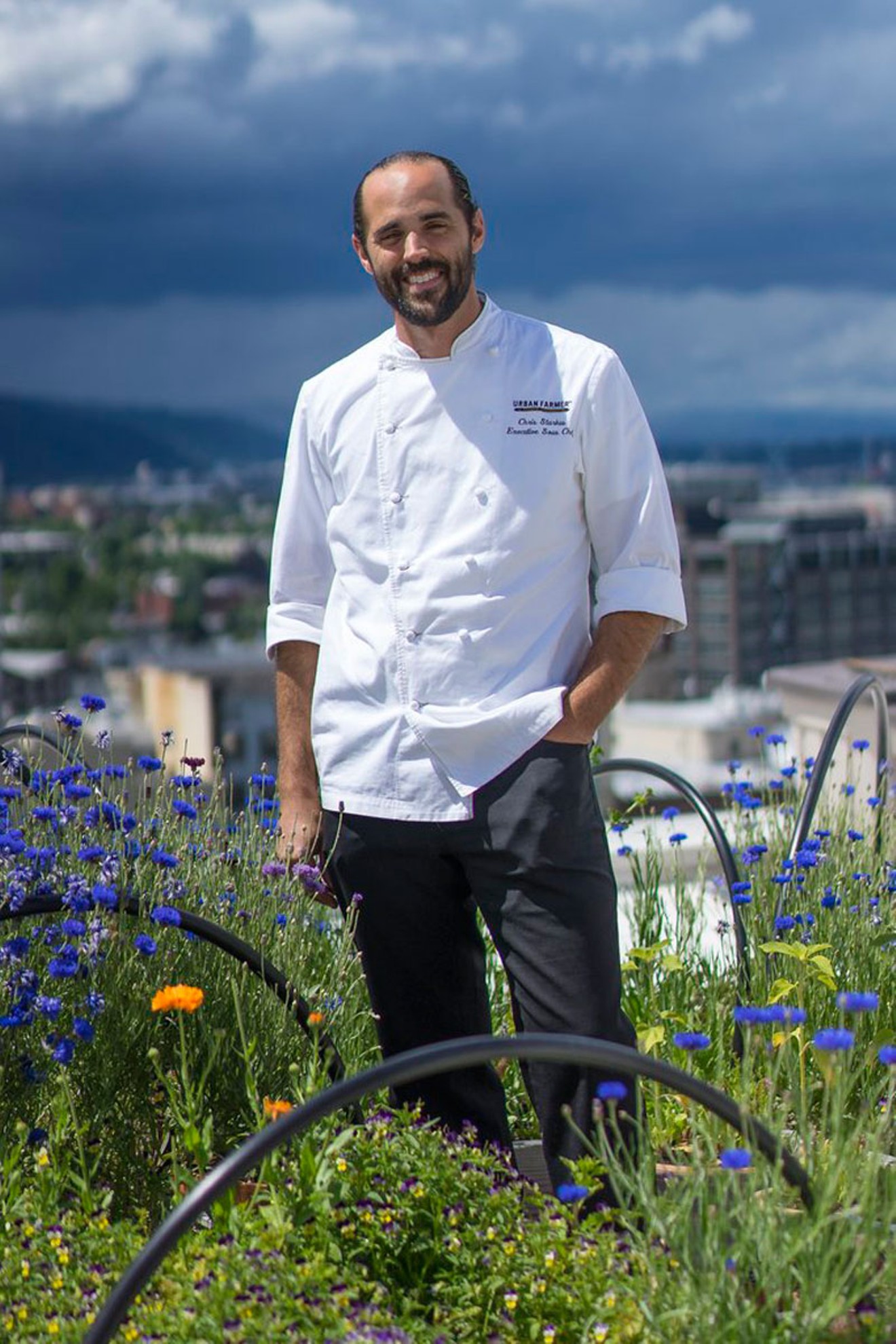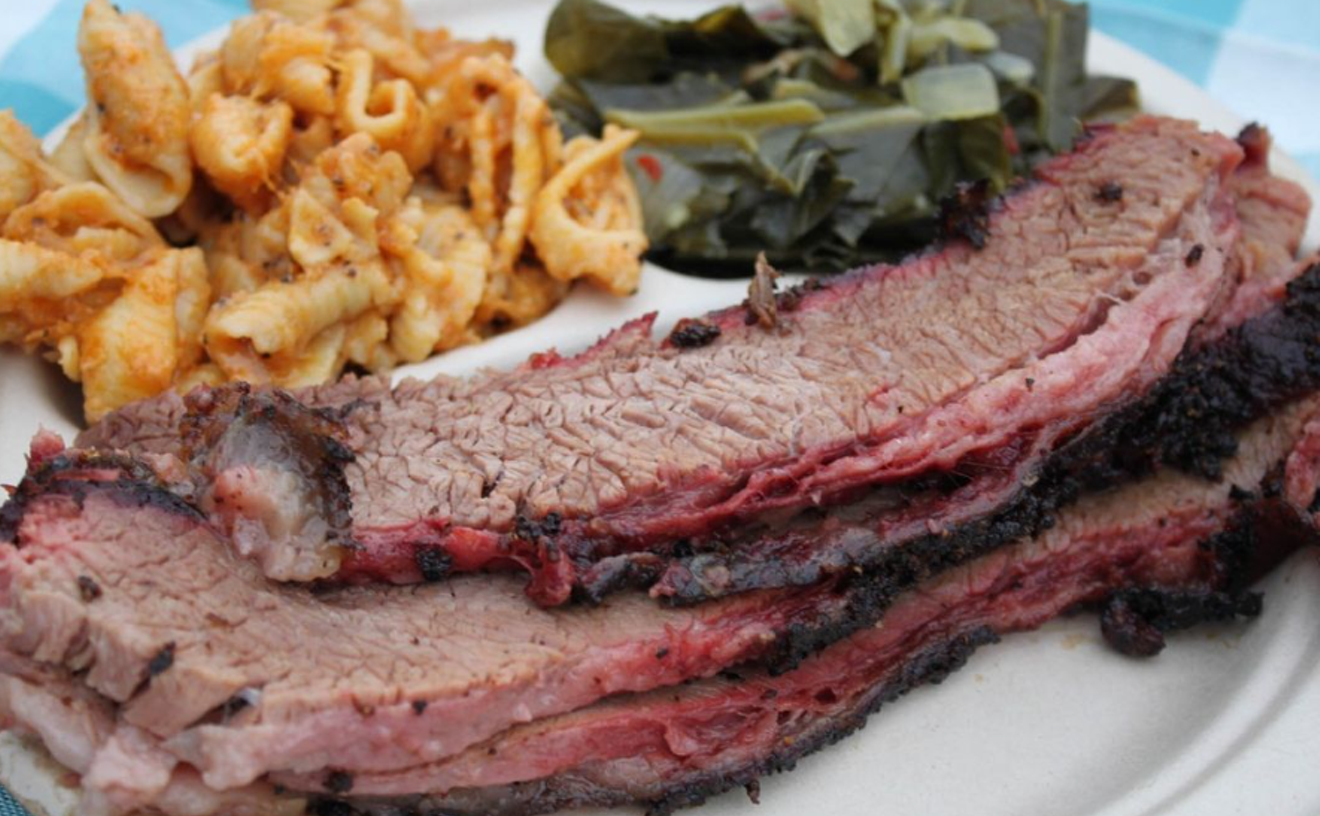A fourth Urban Farmer opened in the Oxford Hotel over the weekend, replacing the McCormick’s Fish House that had been a mainstay there for nearly three decades. The hotel is owned by Denver-based Sage Hospitality, which had waited a long time to take over the prime restaurant space; it’s filled it with the concept that the Sage Restaurant Group first debuted in Portland. Urban Farmer is a steakhouse, offering modern takes on the genre’s classics, bolstered by a sustainability ethos that favors local and organic sourcing. Helming the burners at Urban Farmer is Chris Starkus, who moved here from the Portland flagship. Starkus got his start cooking in Las Vegas fine-dining restaurants under Wolfgang Puck and Alex Stratta before decamping with his family for a friendlier, Pacific Northwest lifestyle. In this interview, Starkus talks about seizing on sustainable sourcing, nursing an obsession with beekeeping, and gaining the “Farmer 15” thanks to a particular late-night snack.
Westword: You just moved to Denver from Portland to open Urban Farmer. What’s your impression of the city so far?
Chris Starkus: There are a lot of passionate people doing great things. It feels like a huge hotbed that’s ready to explode. It feels a little like what Portland was five years ago. And I’ve had so many people welcome me to Colorado. People in Portland were really nice, but people here are really nice. People want to collaborate, they’re open to sharing contacts, and they support the ethos surrounding farmers.
Tell us a little bit about Urban Farmer.
It’s as if a rancher married a partner who is a city art collector; if they had a dinner party, Urban Farmer is what you’d get. There’s a rustic flair, but also refinement. It’s a steakhouse, yes, but we do breakfast, lunch and dinner, and we offer fish dishes and vegetarian items. I don’t want someone who’s a vegetarian to come here and think they can’t eat. You could have the experience of ordering a classic ribeye on a plate with Yukon Gold potato purée, or you could have local greens from Larkspur and our scallop dish. You could run the gamut of a chef’s tasting menu or have a traditional steak and potatoes. You could sit at the bar and have the burger, or dine for one to three hours. We can pair wines and beers and cocktails with your dining experience. And we want to be a place that supports local: We have a patio garden, beehives on the roof, and a mushroom terrarium. We do nose-to-tail butchery. There’s a chop on our dinner menu, we grind scraps into sausages for breakfast, and we do off-cuts for charcuterie. We get whole cows from Yuma and Wyoming. We use kidney fat for tallow candles on the table. We grind our own burgers and dry-age.
Urban Farmer expands farm-to-table to a fairly large scale. This is a hotel restaurant, after all, and presumably, you’re sometimes doing banquets in addition to three meals daily and room service. How do you source for that?
The main thing Urban Farmer does is cook food you’d get at a forty-to-fifty-seat restaurant, but we’re doing it for 250 seats. I saw a panel recently called “farm to really big table.” These are farmers who are organic farming on 5,000 acres. We’re diving into the local network of what people are doing, and saying, “This is what we’re doing. What do you have?” I met Corner Post Meats at the farmers’ market. Because we’re bigger, we can bring in a whole pig or beef and actually use it. That gets them excited.
Tell us a little about your early days in this industry.
When I was fifteen, I got a job at an Applebee’s. I was only expediting and prepping at the time, but I loved being in the restaurant. The kitchen staff spoke a lot of Spanish, so they taught me Spanish and I taught them English. I was not a four-year university person, so when I was getting ready to graduate, my dad said, “Your grandma is in Vegas. There’s a culinary school there — you can do this on a higher level.” When I got there, there was a guy wearing a chef’s jacket peeling potatoes, and I thought that was the coolest thing. My intention was just to go to school full-time, but I was seventeen in a city where you have to be 21 to do anything — so two weeks in, I thought, I’d better get a job. My grandma circled some ads in the paper — Wolfgang Puck was hiring, and she knew Wolfgang and Emeril from the Food Network. I applied to be a busser but said, “I want to work myself into the kitchen.” My interviewer said, “I think we’re hiring entry-level in the kitchen.” I didn’t even know how to hold my knife yet, but they started me that afternoon. I worked my way through the kitchen, and after about five and a half years, I helped open Postrio and did a stint for about a year as pastry sous-chef.
Pastry! How has that benefited you in your career?
A lot of people are afraid of pastry because they never did it — but even today, I can help my pastry chef and communicate what I want. Those two worlds have connected a lot more.
How did you embrace the farm-to-table ethos that informs Urban Farmer today?
I went on Chopped and met Stacey Givens. We talked on set and said, “We gotta get together — we have a lot of common interests.” We did a lot of collaboration dinners together. It got me inspired to ask, what are people really growing? What’s really coming from farms? I started to incorporate that into Urban Farmer. I asked questions; I wanted to know what farmers were doing and understand how to incorporate it into the menus.
Let’s go back to those beehives on the roof. How did you get into that?
When I got the position as chef de cuisine [at Portland’s Urban Farmer], I started beekeeping. I called the owner of Bee Local and said, “I want to put two hives on a rooftop.” It was sort of a trendy thing to do, and I wanted to support pollinators. I fell in love with it and started doing it at my house. I knew enough to get in trouble. I’d be standing there with my suit on and my phone, and I’d have to call [the Bee Local owner] and say, “I don’t know what I’m doing.” I’m currently enrolled at Oregon State University for master beekeeping, and right now, I’m focused on getting through the season and disease control. Here, we have three beehives that were sourced from here. I practice foundation-less beekeeping, which means I get the frame and the bees build the comb — the bees do all the work. There’s evidence that’s better for disease and pest resistance. Beekeeping is about knowing what you can take and what you can’t. One of my hives is a weaker hive; they’re not building enough for the winter. So I have to decide, do I need to feed them to get them to put enough away? They won’t produce the most flavorful honey, but I’m electing to keep the colony alive.
And eventually the honey will make its way onto your menu?
I want comb for our cheese plates and for some of the dishes. We’ll use the honey, pollen and the wax — we’ll melt all that down and make lip balms and candles. I use everything. It’s akin to using the whole animal.
What do you cook at home?
We cook from the garden a lot right now — corn, onions and squash. My wife is from New Mexico, so there’s a lot of calabacitas. We’ll grill off chicken, beef, mushrooms. Pastas with Bolognese. We’ll get things from the farmers’ market, things from the garden, and make this big mystery box. My kids are used to eating like that. My wife cooks a lot, too. She’ll throw cucumbers in stir-fry, and I’m like, you’re not supposed to do that, but somehow it turns out great.
What’s always in your fridge?
Almond or hemp milk. Eggs, because we have chickens. Hot sauces — Tapatío and sriracha. Honey. Avocados. We have a ton of squash. If you don’t have anyone trying to give you squash right now, you don’t have any friends.
Do you have a go-to late-night snack?
Bread, butter, salt and honey. You gain the “Farmer 15” when you first start at Urban Farmer.
Urban Farmer is located at 1659 Wazee Street. Hours are 7 to 10 a.m. and 11 a.m. to 3 p.m. Monday through Friday; 7 a.m. to 3 p.m. Saturday and Sunday; 5 to 10 p.m. Sunday through Thursday, and 5 p.m. to midnight Friday and Saturday. Find out more at 303-262-6070 or urbanfarmerrestaurant.com.
[
{
"name": "Air - MediumRectangle - Inline Content - Mobile Display Size",
"component": "12017618",
"insertPoint": "2",
"requiredCountToDisplay": "2"
},{
"name": "Editor Picks",
"component": "17242653",
"insertPoint": "4",
"requiredCountToDisplay": "1"
},{
"name": "Inline Links",
"component": "18838239",
"insertPoint": "8th",
"startingPoint": 8,
"requiredCountToDisplay": "7",
"maxInsertions": 25
},{
"name": "Air - MediumRectangle - Combo - Inline Content",
"component": "17261320",
"insertPoint": "8th",
"startingPoint": 8,
"requiredCountToDisplay": "7",
"maxInsertions": 25
},{
"name": "Inline Links",
"component": "18838239",
"insertPoint": "8th",
"startingPoint": 12,
"requiredCountToDisplay": "11",
"maxInsertions": 25
},{
"name": "Air - Leaderboard Tower - Combo - Inline Content",
"component": "17261321",
"insertPoint": "8th",
"startingPoint": 12,
"requiredCountToDisplay": "11",
"maxInsertions": 25
}
]














